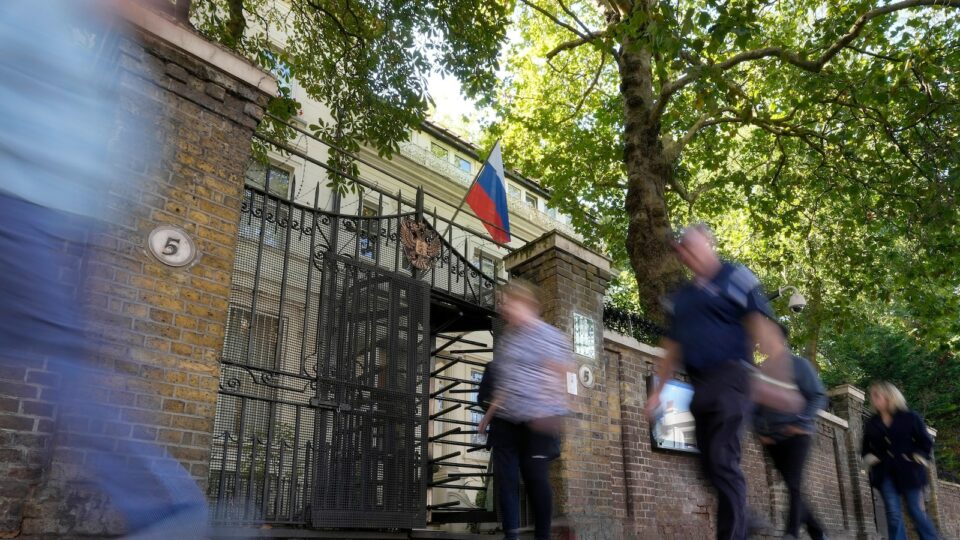How have targeted expulsions been used as a form of political retaliation in the Russia-UK conflict?
Title: Decades of Targeted Expulsions: The Ongoing Russia-UK Conflict
Meta Title: An In-Depth Look at the Ongoing Russia-UK Conflict and Targeted Expulsions
Meta Description: Discover the history, impact, and title=”London Police Arrest Participants in Large Pro-Palestine Protest”>ongoing tensions of the Russia-UK conflict, centering around targeted expulsions, as we delve into this complex geopolitical issue.
The Russia-UK conflict has been a subject of tension and controversy for decades, with targeted expulsions at the forefront of this ongoing struggle. This conflict has impacted various sectors and continues to shape the political landscape of both nations. In this article, we will delve into the history, key events, and lasting impact of the Russia-UK conflict, as well as the targeted expulsions that have been a central point of contention.
The History of the Russia-UK Conflict
The history of the Russia-UK conflict can be traced back to the Cold War era, with the two nations engaging in a power struggle that shaped global politics for decades. Tensions escalated during the Soviet era, as the UK aligned itself with the United States in opposition to the expansion of Soviet influence.
In more recent years, the conflict has been characterized by numerous espionage scandals, diplomatic expulsions, and propaganda warfare. The Salisbury poisonings in 2018, in which a former Russian double agent and his daughter were poisoned in the UK with a nerve agent, marked a significant escalation in the conflict, leading to a wave of diplomatic expulsions.
Targeted Expulsions: A Key Point of Contention
Targeted expulsions have been a central feature of the Russia-UK conflict, with both nations regularly expelling each other’s diplomats in response to various political incidents. These expulsions have served as a form of political retaliation, reflecting the strained relationship between Russia and the UK.
The expulsions have targeted diplomats, intelligence officers, and embassy staff, leading to a significant reduction in personnel at both embassies. This has had a direct impact on diplomatic relations and communication channels between the two nations, further exacerbating the tensions.
Impact on International Relations
The Russia-UK conflict and the targeted expulsions have had a significant impact on international relations, with both nations experiencing strained diplomatic ties with other countries. The conflict has also led to increased scrutiny of Russian activities in the UK and has influenced global perceptions of Russia’s foreign policy.
Additionally, the conflict has had repercussions on trade relations, security cooperation, and cultural exchange between Russia and the UK. These tensions have filtered into various sectors, creating challenges for businesses, academics, and travelers from both nations.
The Ongoing Nature of the Conflict
The Russia-UK conflict remains an ongoing issue, with tensions continuing to simmer beneath the surface. Despite occasional attempts at diplomatic rapprochement, the conflict has persisted, fueled by a series of high-profile incidents that have further strained relations between the two nations.
Efforts to ease tensions and rebuild trust have been met with mixed results. The ongoing nature of the conflict underscores the complexity and deep-rooted nature of the issues at hand, leaving both nations locked in a standoff with no clear resolution in sight.
The Way Forward: Finding Common Ground
Finding a resolution to the Russia-UK conflict remains a significant challenge. However, open dialogue, diplomatic engagement, and multilateral cooperation may offer a path towards de-escalation. Both nations can benefit from finding common ground on issues of mutual interest, such as global security, climate change, and economic stability.
Additionally, fostering people-to-people ties through cultural exchange, academic collaboration, and tourism can help bridge the divide and build understanding between the people of Russia and the UK. These initiatives could serve as a starting point for rebuilding trust and establishing a more constructive relationship between the two nations.
the Russia-UK conflict and the targeted expulsions that have characterized it are complex and multifaceted issues that have far-reaching implications. Understanding the history and impact of this conflict is crucial for navigating the current geopolitical landscape and fostering dialogue towards a more peaceful and cooperative future.
The Recent History of Moscow-London Diplomatic Expulsions
In response to allegations of espionage, Moscow has expelled six British diplomats, prompting a strong reaction from the United Kingdom. This move has contributed to the ongoing tensions between Russia and the West in relation to the conflict in Ukraine.
Expulsions between Russia and the United Kingdom have been a recurring theme over the years, with both sides engaging in tit-for-tat responses. These actions are often characterized as “mirror answers” in Russian diplomatic language.
Major acts of expulsion have occurred between London and Moscow. In one instance, Sergei Skripal, a former Russian intelligence officer who was working as a double agent for Britain, along with his daughter were severely poisoned with Novichok, which is a Soviet-developed nerve agent. In response to this incident, British Prime Minister Theresa May identified Russia as responsible for the attack and ordered the expulsion of 23 diplomats - leading Russia to reciprocate by expelling an equal number of Britons.
Another significant event took place when Oleg Gordievsky, who had been spying for British intelligence while serving as KGB’s station chief in London, was successfully exfiltrated from the Soviet Union. Following this operation, Britain expelled 25 Soviet diplomats based on information provided by Gordievsky; Moscow responded by expelling 25 British officials.
Additionally, Britain managed to recruit an operative named Oleg Lyalin from the Soviet trade delegation who was also working for KGB. After concluding international talks on Berlin’s divided city status that were being jeopardized by potential espionage revelations against Soviet diplomats and their spouses., Britain subsequently expelled 90 Soviet officials and barred 15 others from returning – totaling at 105 expulsions.
These historical events reflect incidents where measures such as diplomatic expulsions have played a significant role in shaping relations between Russia and Britain during periods of heightened tension.


